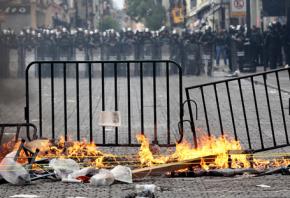Mexican teachers expand strike
reports on new efforts by teachers in Mexico to step up their struggle.
AFTER MORE than a month on strike, tens of thousands of Mexican teachers were joined by university students and other unions in calling for a national work stoppage, un paro nacional, for September 19 and 20. The strike's expansion comes in response to a federal police assault on the teachers' encampment in the national plaza, el zócalo, in the center of Mexico City on September 14, which expelled the protesters.
The striking teachers are part of the National Coordination of Education Workers (CNTE), a militant caucus within the National Union of Education Workers (SNTE). The SNTE leadership traditionally supported the Party of Institutional Revolution (PRI)--which ruled Mexico as a one-party state for more than 70 years until 2000--in exchange for the PRI looking the other way as the union's leading bureaucrats enriched themselves.
Last February, Mexican President Enrique Peña Nieto, elected in July 2012, imprisoned SNTE President Elba Esther Gordillo on corruption charges. Though undoubtedly guilty, Gordillo's downfall sprang from her refusal to comply with Peña Nieto's plans to implement a No Child Left Behind-type law in Mexico. The reforms amended the Constitution in order to impose mandatory high-stakes standardized testing and open the way to a wholesale attack on tenure for public school teachers.

Duly cowed, the current SNTE leadership and the supposedly left-wing Party of the Democratic Revolution (PRD), a leading opposition party in the National Assembly, have been brought in line behind Peña Nieto's attack on education.
Teachers affiliated with the CNTE are a minority in some SNTE regions, but have control of statewide regions such as Oaxaca. They have refused to submit to the new reforms without a fight.
It's difficult to tell how effective the strike is on a national level given the SNTE official leadership's opposition, but the CNTE has mobilized hundreds of thousands of teachers, students and supporters in marches in Mexico City, the strike has spread from Veracruz on the east coast to Guadalajara on the west.
On September 14, the CNTE organized the Second Popular Teachers Summit, which brought together more than 100 unions, community and student groups and political organizations to build support for the strike and organize unity with the ongoing campaign to stop Enrique Peña's campaign to privatize PEMEX, the state-owned oil company. Rather than attempt to immediately retake the zócalo, the CNTE called on the Summit to organize the two-day national strike this week.
WHILE THE teachers remain strong, strains may be starting to show. On Wednesday, September 18, La Jornada, Mexico's leading left-leaning daily, reported that CNTE General Secretary Rubén Núñez Ginés, a leader in the Oaxacan Section 22 of the national union, was heckled off the stage at a demonstration in Tlatelolco, the location of the 1968 student massacre, to chants of "Urgente, urgente, cambiar al dirigente!" ("It's urgent, it's urgent, change the leadership!")
After Núñez left the stage, several columns of teachers and university students numbering in the hundreds attempted to march toward the zócalo before being stopped by police columns.
The September 19 and 20 strike will be followed by a Third Popular Teachers Summit on September 21 to assess the success of the mobilizations and debate next steps.
The scope of this strike and mobilization will be an important indicator of the teachers' strength as they enter the second month of their strike. Since the National Assembly has already passed the reforms, the teachers are fighting a difficult battle to get them reversed. The government's strategy clearly aims to starve the teachers back to work in the poorer southern states, while vilifying them in Mexico City as responsible for repeated disruptions.
Over the last 20 years, this strategy has proved successful--dozens of unions have been smashed, with their members' jobs liquidated in massive privatization schemes. Recently, some 40,000 workers in the Mexican Electrical Workers Union (SME) lost a fight to save the public electrical utility in Mexico City. The SME continues to fight, but the government feels confident it can now bring the teachers to heel.
The coming week will prove critical in determining if the teachers can throw a wrench into Peña Nieto's plans.


